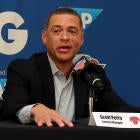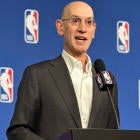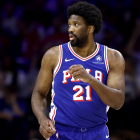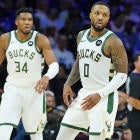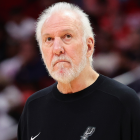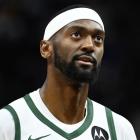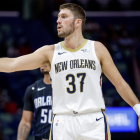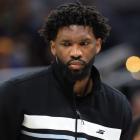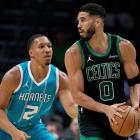TARRYTOWN, N.Y. -- For the first time since they struck out with their two max slots, the New York Knicks had to answer for themselves. At their practice facility on Monday, executives Steve Mills and Scott Perry tried to spin their summer as something other than a disastrous letdown. In these media day takeaways, we will start there.
'Successful' seems like a stretch
In the absence of James Dolan, Mills had to answer for his owner's misplaced confidence. "Jim knew we were going to have a successful free agency period and we feel like we did that," Mills said, as astonishing statement from a person who had to put out a press release on June 30 addressing Knicks fans' disappointment.
Mills, Perry and coach David Fizdale each delivered an opening statement before taking questions. In Mills' speech, he said they were "really excited" about their offseason and called free agency a "very, very fluid process." He even used a cliche typically reserved for players: "Control the things that you can control."
The Knicks' public position is that they should not be held responsible for the whims of elite athletes. Signing superstars was never the plan, but rather one of several. They want their fans to believe that everything is not just fine, but great.
"You'll have to talk to those players about why they made the decisions that they made," Mills said. "But there were a lot of max-type players that we could have met with, that were interested in coming here. We had a certain way we wanted to build this team, and this is how we chose to build it."
Which "max-type" players, exactly, did the Knicks turn down? Were Khris Middleton or Tobias Harris going to leave contending teams in order to join an organization that couldn't pay them as much money? Would Jimmy Butler, D'Angelo Russell or Al Horford have picked New York over the teams they chose to join? Did Kemba Walker want to come home, only for the Knicks to reject him? Mills is selling the idea that the front office didn't throw money at players who aren't franchise-changers, but the idea that they wanted to sign a bunch of guys to short-term deals is ludicrous on its face. They did not trade Kristaps Porzingis for this.
Dogs
"There's a lot of dogs on this team," Marcus Morris said, and a reporter asked him to define the term.
"Have you seen me play? That's my definition right there," Morris said. "There you go."
Morris said he sees a lot of players on the roster who want to prove themselves, who will play hard. He likes that the young guys are willing to listen, that the returning guys have "a chip on their shoulder from only winning 17 games."
Bobby Portis said the best thing about the Knicks is that they have "a lot of guys that are always picked second," underdogs who "nobody really believes in." Taj Gibson said that, being around his teammates for the last month, he has felt "a sense of urgency" about them, as they want to prove people wrong. Mills said that the front office targeted players who could help the Knicks establish an identity built around competitiveness.
"New Yorkers are going to like this team," Mills said. "The grittiness of these players. The toughness of these guys."
The party line was all about improving on last season and not backing down from the challenge in front of them. No one made bold claims about making the playoffs, but it's obvious that there are expectations. The Knicks are not tanking.
"I can tell you this first and foremost: It's not going to be like last year," Morris said.
Morris, by the way, believes that the young Knicks can learn the right mentality from vets such as himself. After initially saying that you are "born a dog" and "it gotta be in you," he took it back. "If you be around a bunch of dogs," Morris said, "it'll rub off on you."
Positionless basketball!
Nine years ago, Monta Ellis said at media day that he couldn't play in the same backcourt as Stephen Curry. Nothing like that happened here. Instead, every time the Knicks' backcourt and frontcourt logjams came up, players deferred to Fizdale or said something about intra-team competition or positionless basketball.
"Everybody says that's just how the game is now. You look at the championship, you look at the Finals and playoffs and they might have five guards out there or five forwards, it doesn't matter. Whatever lineup is out there to help us get wins is what matters."
In his opening statement, Perry took aim at those who have criticized the Knicks for signing so many bigs men. A lot has been made over the summer that oh, you signed four power forwards," he said. "Well, I think if you examine our roster at the end of the year, under contract we only had one player in the frontcourt and that was Mitchell Robinson, who is a second-year player. So we were going to have to go out and stock our frontcourt. And each and every one of those players plays multiple positions."
This is a decent rebuttal to the wording of the criticism, but not to the criticism itself. Even if Kevin Knox and Morris never play a minute at power forward, Fizdale will have to find playing time for Robinson, Randle, Portis and Gibson. The backcourt rotation is complicated, too, with Dennis Smith Jr., Elfrid Payton and Frank Ntilikina battling for point guard minutes and R.J. Barrett needing the ball in his hands. Wayne Ellington probably needs minutes because New York will be desperate for spacing otherwise, and Allonzo Trier might be marginalized.
Gibson acknowledged that the coaching staff will have decisions to make in this regard, and pledged to help by encouraging the players who do not get the roles they want. The reality, though, is that New York has constructed a team that does not have a logical, obvious pecking order, and that could be tough to manage.
The next step, already?
"I feel like this team is ready to take that next step," Fizdale said, and that means that Barrett, Knox, Robinson and the rest of the young players "really gotta earn" their playing time. The coach called this the next phase of their development, directly saying that he does not think the free-agent additions will "get in the way of the young talent that we have here."
The Knicks claim to be building a team responsibly. They haven't surrendered their financial flexibility, and they want their young players to grow in games that feel meaningful. They have added proven vets who are supposed to help their culture, and they have a coach who says he wants them to play faster and keep everybody "engaged and involved" in the offense. All of that sounds good, right?
This time last year, however, Fizdale said the same stuff about playing a modern style and then New York chucked up a bunch of bad midrange jumpers again. I like that Knox said the vets have brought a better vibe and spirit to the team, but all of this talk about toughness and experience might not matter without proper spacing and role definition. The Knicks' preference for long-term financial flexibility required them to stay away from long-term deals outside of Randle's, which could lead to selfish play if things don't come together quickly.
How many games does New York have to win to show that it has made progress, to gain the league's respect and to justify the fact that Fizdale said Barrett will have a tougher time getting minutes than Knox did last season? I don't know if that is possible to answer, and I don't even fault the Knicks for thinking that their players will develop better in a winning environment. I'm just not sure that they have one.









